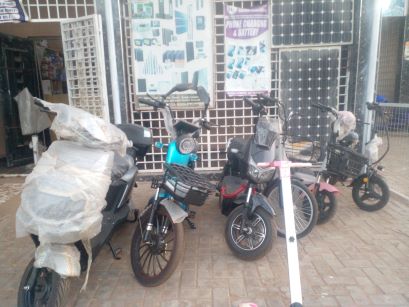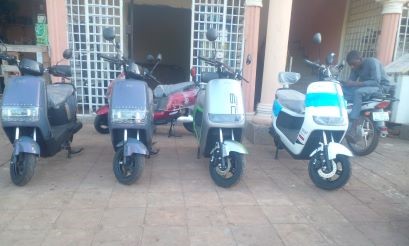As fuel prices continue to rise in Nigeria, commuters are increasingly seeking affordable and sustainable transportation alternatives, with electric motorcycles becoming a choice for many.
In Sokoto, the demand for electric motorcycles has surged, reflecting a broader trend across the country towards eco-friendly vehicles.
Marketers say that the product is experiencing a market uptrend as more people are exploring its advantageous nature.
According to a vendor on Kaduna Road Mr. Mainasara Yusuf, the market demand is rapidly increasing, with at least one new buyer daily.
Users of electric motorcycles in Sokoto also describe the vehicles as a convenient and eco-friendly transportation option.
“I thought for a means to boycott this rising cost of fuel in country and thank God, its all settled on this electronic vehicle. Now i can roam the city without emission or disturbing the public, most importantly without minding my fuel guage,” said an EV user, Sadiq Dan-Inno.
Electric motorcycles have proven to be cost-effective, with many users noting their low maintenance needs.
“The machine has no fuel engine, all you need is charge it and it moves. That reduces complex maintenance, it’s been over four months since I bought this and nothing like operational fault or something,” said another consumer, Mansur Mustapha.
The electric motorcycles, which are primarily imported from China, come in various models with different battery capacities and price points.
A six-battery model is priced at N1.3 million, while a four-battery model costs around N1 million.
Despite the growing interest, there are still some concerns among potential buyers. Some express doubts about the durability and range of the electric motorcycles.
“The machine isn’t durable enough for long-distance travel, and I’m not sure it can handle the rough roads in our villages,” said an EV owner, Mr. Ejuke Bright.
A dealer on Kaduna Road, Mr Abubakar Tahir also highlighted the high upfront cost of electric motorcycles as a barrier to widespread adoption. However, he remains optimistic that prices will decrease over time as production scales up.
The Nigerian government is increasingly supportive of the electric vehicle industry.
In September 2024, the Innoson Vehicle Manufacturing Company (IVM) made headlines with the launch of Nigeria’s first locally produced electric vehicle in Nnewi, Anambra state, marking a new chapter in the country’s electric vehicle (EV) industry.
With abundant solar energy resources and growing interest from both local and foreign investors, Nigeria is well-positioned to lead Africa in the transition to clean transportation.
The country’s commitment to carbon neutrality by 2026, as emphasised at COP26, underscores the importance of electric vehicles in achieving energy security and environmental sustainability.

Ogun State, for example, has plans to build a $40 million EV assembly plant, which will include motorcycles, tricycles, cars, and buses. This initiative aims to create over 60,000 jobs and improve the country’s EV infrastructure.

Partnering with African EV maker, Spiro, the state is positioned to improve the charging infrastructure for the product’s durability and cost-effectiveness for wider adoption in the country.
With abundant solar energy and identified interests from both foreign and domestic investors in solar-powered charging infrastructure, the adoption of the EVs in Nigeria will widely be achieved, with potential to lead African in clean transportation which has proven to be economically and environmentally sustainable.
The gathering of the COP26 shows Nigeria’s commitment to achieving carbon neutrality by 2026.
The Programme Manager, Energy Transition Office Nigeria, Lolade Abiola emphasized the need for a swift transition to electronic vehicles bridging the gap between technological advancement and energy security.
Sokoto residents are calling for immediate government support to further promote the development and spread of electric vehicles.
“If the government can fully support this, attract more foreign investors for mass production, cut down unnecessary tasks, the cost of living will be reduced to the barest minimum, positively affecting the country’s economy,” said an economist, Arinze Agbolahon.


